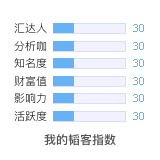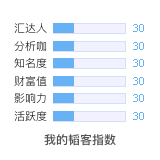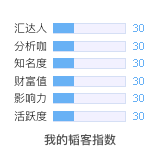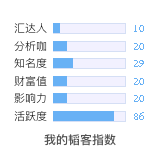102楼
是啊,喊了一个月了,终于下来了。:L
trend, chance, risk, order, reap
modeling......
发表于:2010-04-17 14:21只看该作者
103楼
不是猜谜
你那个 ST 么




韬客社区www.talkfx.co
104楼
好像不是,上次step推荐我买,我胆子小不敢买st的股票。
trend, chance, risk, order, reap
modeling......
发表于:2010-04-17 14:31只看该作者
105楼
我也是的 虽然我就喜欢买垃圾股
韬客社区www.talkfx.co
发表于:2010-04-17 16:11只看该作者
106楼
能解百分之九十吧。不过,白天偶已经割肉了。短期内不碰美股了,不好做,波动太少了。哎。美骨,每次都让偶受伤。高盛早一天出事多好。
韬客社区www.talkfx.co
107楼
昨天没看到你的帖子,今天补充回复一下。
一般来说美元日元和股市是相反的,因为股指镜像风险偏好,而美元日元是视作避险货币。
但是这样的情况也不是100%正确,因为有的时候市场对避险货币的选择也会变化,如果美国经济遭受一些重大事件的冲击,而欧元区却没有受到任何影响,那么欧元就会被视为避险货币,比如在美国subprime crisis的初期,大家都认为所有的风险都局限在美国,世界经济与美国经济decoupled,美元是跌的。
109楼
奥美止盈点放在0.9150。
trend, chance, risk, order, reap
modeling......
110楼
这几天肥美会有反复的,所以可以考虑低抛高空的策略,0.93可能还会再上探一次。
trend, chance, risk, order, reap
modeling......
111楼
美瑞止盈点放在1.07。
trend, chance, risk, order, reap
modeling......
发表于:2010-04-19 03:13只看该作者
112楼
美国给了3个月的观察期,中国开始为人民币升值做实质性的准备工作,楼主如何看中国这3个月的的调控以及以后的人民币升值问题呢。。。。。。澳元会受到影响较大吧。。。。。
耐心+轻仓+止损
113楼
你可以看看华尔街日报今天的一篇文章,上面说到人民币升值以后的影响。我转帖一下。
trend, chance, risk, order, reap
modeling......
114楼
(By TOM LAURICELLA
, ALEX FRANGOS
and MARK GONGLOFF
) When China allowed the yuan to rise in 2005, it startled investors and sent waves through the financial markets. This time around a revaluation is widely expected. So will a higher yuan turn out to be a big yawn? Not necessarily. Based on the experience of 2005, a rising yuan could boost other Asian currencies, lift commodity prices and hurt U.S. Treasurys. Domestic-focused Chinese stocks are also likely to rise. With China being an even bigger economic force throughout the global economy, sucking up commodities and dominating exports, the market effects could be bigger this time around. While some market moves have begun in anticipation of a policy change—oil prices are up and Asian currencies are rising—some analysts believe the market may be underestimating the size of any revaluation, leaving open the chance of a bigger-than-expected reaction when a change comes. The currency markets have for months expected the Chinese currency to rise a bit more than 3% this year. That would take the dollar down to roughly 6.60 yuan from 6.80 yuan, where it has been pegged since 2008. At that time the financial crisis prompted China to put a halt to the gradual, 21% appreciation allowed since July 2005. But analysts at Morgan Stanley believe China could drive the yuan up 4% to 5% in several steps in 2010, and take the yuan to 6.17 by the end of 2011. Barclays Capital analysts also expect a gradual 5% increase this year. So far, the markets are betting on China making a gradual and modest move. (待续) [ 本帖最后由 jiatim 于 2010-4-19 11:22 编辑 ]
, ALEX FRANGOS
and MARK GONGLOFF
) When China allowed the yuan to rise in 2005, it startled investors and sent waves through the financial markets. This time around a revaluation is widely expected. So will a higher yuan turn out to be a big yawn? Not necessarily. Based on the experience of 2005, a rising yuan could boost other Asian currencies, lift commodity prices and hurt U.S. Treasurys. Domestic-focused Chinese stocks are also likely to rise. With China being an even bigger economic force throughout the global economy, sucking up commodities and dominating exports, the market effects could be bigger this time around. While some market moves have begun in anticipation of a policy change—oil prices are up and Asian currencies are rising—some analysts believe the market may be underestimating the size of any revaluation, leaving open the chance of a bigger-than-expected reaction when a change comes. The currency markets have for months expected the Chinese currency to rise a bit more than 3% this year. That would take the dollar down to roughly 6.60 yuan from 6.80 yuan, where it has been pegged since 2008. At that time the financial crisis prompted China to put a halt to the gradual, 21% appreciation allowed since July 2005. But analysts at Morgan Stanley believe China could drive the yuan up 4% to 5% in several steps in 2010, and take the yuan to 6.17 by the end of 2011. Barclays Capital analysts also expect a gradual 5% increase this year. So far, the markets are betting on China making a gradual and modest move. (待续) [ 本帖最后由 jiatim 于 2010-4-19 11:22 编辑 ]
trend, chance, risk, order, reap
modeling......
115楼
A modestly higher yuan "has been out there for quite some time" from the market's perspective, says Richard Gao, a portfolio manager for Matthews Asia Funds.
An overly aggressive yuan appreciation could be viewed as China clamping down strongly on economic growth. That could result in a flight out of riskier assets, such as emerging-market stocks and commodities.
"If the Chinese came out and let the yuan float freely against the dollar, that changes the entire analysis," says Nicholas Bohnsack, strategist at Strategas Research Partners. But, he says, "the likelihood of that is extremely low."
And all bets are off should China decide against making any changes to its currency policy.
HSBC's currency analysts are recommending that clients hedge against Chinese inaction with relatively inexpensive currency bets that would benefit from the status quo dollar-yuan level. HSBC's view is that the window for China to move is this quarter. But if it waits, the second half of the year will be filled with charged international meetings and the U.S. midterm elections, which will make it politically difficult for China to act while looking like it isn't succumbing to outside pressure. And a possible moderation in inflation later this year could lessen the policy justification for letting the yuan rise.
Asian countries, among the most likely to be prime beneficiaries of a rising yuan, have already strengthened in anticipation of a move, and more gains are likely. The dollar has lost 6.8% this year against the Malaysian ringgit, 4.8% against the won and 1.7% against the heavily managed Taiwan dollar. On Wednesday, the Monetary Authority of Singapore revised up its targeted trading range for the Singapore dollar by about 1.3% and said it will allow a gradual appreciation.
Governments there have spent the past year straining to keep their currencies from rising in order to maintain their competitiveness against China. Managing these exchange rates has meant aggressively selling their own currencies and buying dollars.
Sophia Drossos, co-head of global foreign-exchange strategy at Morgan Stanley, says the currencies of South Korea, Taiwan and Malaysia are among those most likely to get a lift from the yuan.
"If China allows more currency strength, then other countries in the region that have strong trade with China, or compete with China, would be more comfortable allowing their currencies to rise," Ms. Drossos says.
The euro "is most at risk," says Ms. Drossos. After buying dollars through currency-market intervention, central banks diversify by selling some of those dollars and buying euros. Reduced intervention could lead to reduced demand for the euro. Commodity-related currencies like the Australian dollar are also likely losers.
J.P. Morgan Private Bank is recommending investors bet on some currencies by buying bonds from the World Bank. The bank has issued bonds in the South Korean won, the Singapore dollar and other currencies. Rebecca Patterson, global head of foreign exchange and commodities at J.P. Morgan Private Bank, says investors can benefit if the currency rises, while having the protection of the World Bank.
Ripples from the currency markets could spread to U.S. Treasurys, as Chinese and other Asian governments, with fewer dollars on their hands, buy fewer U.S. Treasurys. Worries of reduced demand from China could result in a short-term selloff, says Guy LeBas, fixed-income strategist at Janney Capital Markets.
In 2005, 10-year Treasury yields jumped from 4.17% to 4.41% in the 14 days after the July revaluation. And from August through December of that year, China's net purchases of Treasurys slowed to a monthly average of $2.7 billion, from $10.5 billion in the previous seven months, according to Treasury Department data.
Peter Fisher, vice chairman for fixed income at BlackRock Inc., says that while attention will quickly focus on U.S. Treasurys, "if it's a gradual enough crawling peg and the current-account and trade flows remain more or less the same—which is what I would expect—it's probably a passing issue."
In the stock market, the last time China began to allow its currency to strengthen, it helped fuel a huge bull market in Asian stocks. Between July 2005 and October 2007, the Hang Seng China Enterprises Index rose 319%.
At least some of the yuan-strength trade has already helped lift Asian stocks, says Oscar Leung, a fund manager for ING Investment Management in Hong Kong. Shares of Chinese airline companies have benefited recently because they tend to have dollar-denominated debt, but earn in yuan. The paper pulp sector has also gained because companies pay for used paper in the U.S. in dollars, then process in China and sell it domestically for yuan.
Property developers with land financed by foreign debt are also likely to gain.
At Matthews Asia Funds, Mr. Gao is avoiding exporters that would be hurt by a stronger yuan, such as toy and shoe manufacturers, and instead tilting toward Chinese companies poised to benefit from a growing domestic consumer base, such as telecom companies and financials.
Many expect a yuan revaluation to lift commodity prices as it did in 2005, when crude-oil prices jumped nearly 15% in the month after the news.
With a stronger yuan, imported raw materials already in high demand in China—such as crude and copper—would become cheaper there. That could allow increased demand from Chinese companies.
(转自wsj)
[ 本帖最后由 jiatim 于 2010-4-19 11:21 编辑 ]
发表于:2010-04-19 03:21只看该作者
116楼
英文不好哦,看不懂呀。。。。:L :L :L
117楼
呵呵,我最近忙,没时间翻译,看看那位兄台有空,翻译总结一下。
trend, chance, risk, order, reap
modeling......
118楼
这几天房地产股票跌的那个叫惨啊,60%二套房贷款首付,三套房的拒贷。
庆幸自己的房地产相关的股票提前都出来。:L
trend, chance, risk, order, reap
modeling......
119楼
美瑞多单和奥美空单平仓,每个货币对还有50点左右的利润空间,不等了,感觉反弹的几率比较高,观察一下。
trend, chance, risk, order, reap
modeling......
发表于:2010-04-19 05:28只看该作者
120楼
政府已无路可退,必须主动将资产泡沫挤掉一部分才能升值,否则,升值后被动调整代价无法预计。。。。。。好在美国给了一段缓冲期,加上人民币升值过渡期(不会一次性重估到位),可以将痛苦降低很多。。。。
[ 本帖最后由 卫国 于 2010-4-19 13:30 编辑 ]















